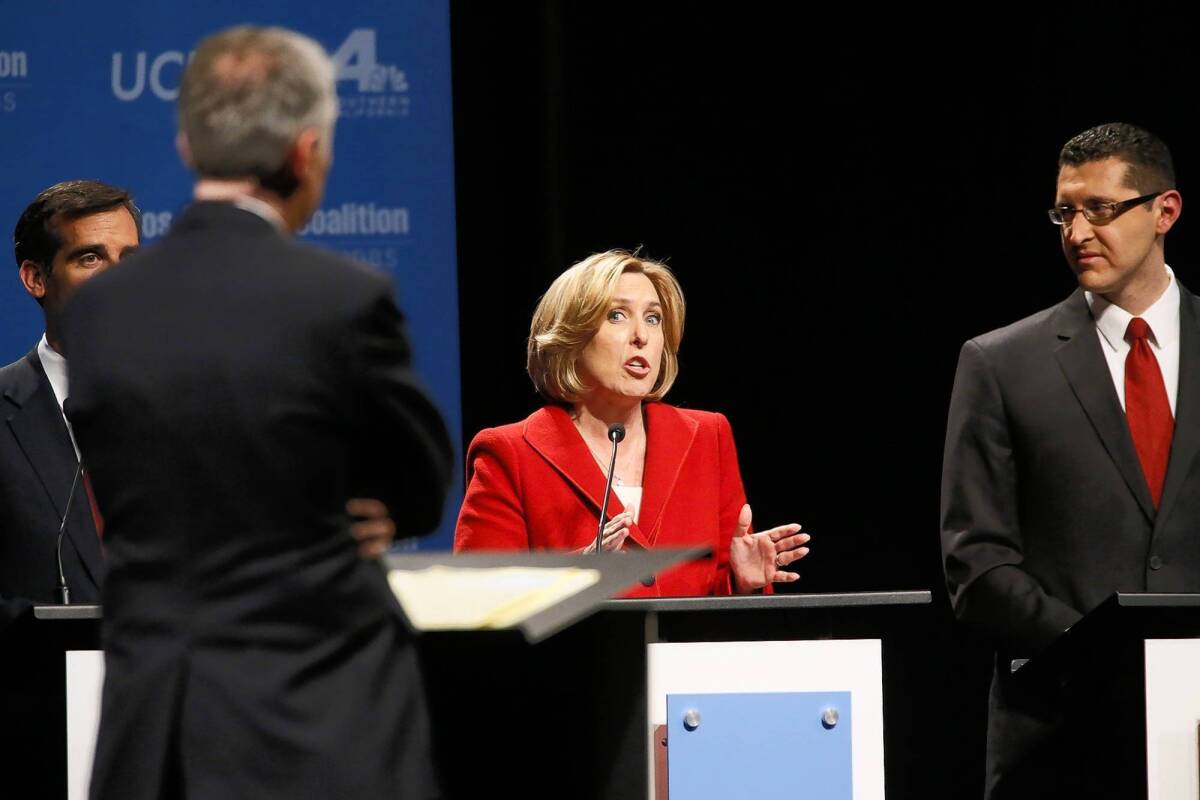Wendy Greuel’s $160-million savings claim raises questions

- Share via
At virtually every campaign stop, Los Angeles mayoral candidate and City Controller Wendy Greuel points to eliminating $160 million in “waste, fraud and abuse” she’s found at City Hall as a solution to the city’s fiscal troubles and evidence that she would be a tough fiscal manager as mayor.
But most of the dollar total in Greuel’s claim, now featured in television ads, relies on two audits that depend on an accounting maneuver and a large revenue projection that the controller’s office itself said was unrealistic from the start.
Many of the dozens of audits cited by Greuel’s campaign to support the $160-million claim reveal shortcomings in municipal policy and recommend “best practice” reforms that many people inside and outside of City Hall would agree are needed.
FULL COVERAGE: L.A.’s race for mayor
While the reports identified potential new revenue and elimination of waste, the amounts cited by Greuel’s campaign would not be immediately available to the incoming mayor, although Greuel has suggested otherwise.
“My first day in office, I’m going to stop the cycle of crisis and layoffs and lack of services,” she told the Sherman Oaks Homeowners Assn. at a debate. “And I will implement the $160 million worth of waste, fraud and abuse that I found.”
Greuel said in a statement Wednesday evening that she stands by her audit findings. She called the $160 million “just the tip of the iceberg” and added that, as mayor, she would “change the way government works so that we spend our precious taxpayer dollars more wisely and efficiently.”
Greuel’s supporters say she deserves credit for being specific about how she would make the city bureaucracy more efficient. And Greuel campaign spokeswoman Shannon Murphy said the projections used by the controller’s office were compiled by professional auditors who had no political motivation.
But City Councilman Eric Garcetti, a rival for mayor, has attacked Greuel’s claims. His aides say the savings and new revenue actually produced for the city amount to just $239,000.
Half of Greuel’s $160 million — as broken down on her campaign website — comes from a single audit on unrealized revenue from a “street furniture” contract between the city and a company called CBS Decaux.
That 2012 audit said the city lost $23.1 million because the company hadn’t paid as much as predicted to place advertising on bus shelters, newsstands, public restrooms and kiosks. An additional $57 million “could be lost” in the future if Los Angeles does not improve the contract, for a total shortfall of $80.1 million, Greuel’s office contended.
But CBS Decaux said it would come nowhere near the $150 million it promised to pay the city over 20 years because bureaucrats, and especially City Council members, rejected many of the locations the company wanted for its shelters and advertising “pillars.”
The city’s Bureau of Street Services, the chief legislative analyst and the city attorney all agreed that the advertising company had properly paid the city at a reduced rate. And Greuel’s audit acknowledged that $8.2 million was “not recoverable.”
The controller’s office called for a renegotiation of the agreement and calculated future losses of $57 million using a best-case scenario: that the company would be able to place all of the advertising initially planned and the city would be paid at the rates originally agreed to. Greuel, in her own cover letter for the audit, concluded: “It is clear, however, that this contract was unrealistic in terms of expectations from the very beginning.”
Murphy, the Greuel campaign spokeswoman, said auditors working for the controller “felt compelled to highlight the $57-million figure.”
“This is absolutely a warning call that Controller Greuel put out. She is saying, ‘This is going to be a huge problem for the city if nothing is done differently.’ And, in fact, nothing has been done differently.”
The city had made no progress on renegotiating with CBS Decaux.
The controller’s audit notes that the City Council caused the “majority of delays” in the program by blocking or delaying approval of the street advertising. Murphy blamed the “failed leadership” of city lawmakers, saying it had cost Los Angeles millions in revenue.
City records show that Greuel, who served on the City Council from 2002 to 2009, contributed to the bottleneck in her San Fernando Valley-based district. A 2005 report by the chief legislative analyst’s office found 11 other council offices approved the advertising structures more frequently than Greuel’s office, although her approval rate improved slightly by 2007. Greuel staffers Wednesday blamed the approval process for the problems and noted that Greuel’s audit recommendations would have streamlined placement of the advertising structures.
The second-biggest example of waste, fraud and abuse on Greuel’s list is $24.7 million from the Real Property Trust Fund. The 2010 audit on that topic did not identify missing or uncollected funds, but rather money that Greuel concluded should be transferred between city accounts.
At issue was the 50% of funds from sales of surplus public property and from oil pipeline franchises that traditionally has gone into council members’ discretionary accounts. The money has been used to pay for pocket parks, graffiti removal and, occasionally, salaries for City Council staff.
Greuel suggested in her audit that the money be shifted to the city’s cash-strapped general fund. The council voted in 2010, after the Greuel audit, to give up $12 million that normally would have paid for special projects in members’ districts and instead use it to replenish the city’s emergency reserve.
More to Read
Sign up for Essential California
The most important California stories and recommendations in your inbox every morning.
You may occasionally receive promotional content from the Los Angeles Times.











